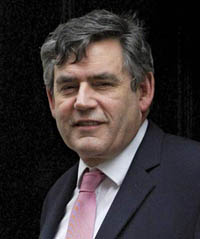Brown: airports, public spaces need better protection against car bombs

As Britain’s terrorism minister warned of a 30-year battle against extremists, Premier Gordon Brown unveiled plans Wednesday to tighten defenses against car bombs at British airports and rail stations.
Prime Minister said airports and 250 of the busiest train terminals will get new blast barriers and impose strict limits on access for vehicles.
Thousands of movie theaters, shopping malls, hospitals and schools will be advised - some by dedicated counterterrorism staff - on how to protect the public from bomb blasts.
Brown said a review led by terrorism minister Alan West, former head of the Navy, found no major flaws in current defenses, but recommended extra protection against car bombs - a tactic once used by Irish Republican terrorists and now adopted by Islamic extremist groups.
The review of nearly 900 public spaces was conducted following failed car bomb attacks in London's West End entertainment district and Glasgow airport earlier this year.
It came more than two years after the July 2005 suicide bombings on London's transport system that killed 52 people and the four British attackers.
Brown said new baggage checks will be introduced at major rail terminals, but restrictions limiting air passengers to one piece of hand luggage per flight are being relaxed.
The leader acknowledged changes likely spell more disruption for passengers, who already face strict baggage checks and long lines at security gates.
Some business leaders already claim to avoid London's main Heathrow airport because of the associated hassles.
At a breakfast meeting with architects and security experts, West and Brown discussed plans to design new public buildings, including soccer stadiums and concert arenas, to reduce the impact of explosions and shrapnel.
West, also an ex-head of defense intelligence, warned the meeting the current threat of terrorism is likely to last for a generation.
"It will take 30 years to excise that cancer of terrorism, I believe," he said.
Brown told parliament major work was needed to isolate extremist preachers and neutralize their message, particularly following worries school children have access to violent propaganda.
Jonathan Evans, head of the domestic spy agency MI5, claimed last week young teenagers were being radicalized to carry out terrorist plots.
Internet and technology companies will be asked to help stop terrorist propaganda being distributed online, Brown said.
Public libraries and universities will also check extremist literature is not being handed out on their premises.
Brown made no announcement on contentious proposals to extend the period police can hold terrorism suspects before they are charged or released.
Civil rights campaigners and many Muslims oppose raising the current maximum of 28 days. Police claim the complexity of current plots means they need more time to investigate.
Subscribe to Pravda.Ru Telegram channel, Facebook, RSS!


